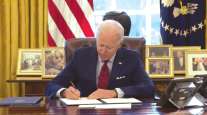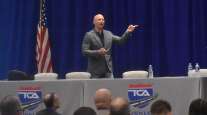Senior Reporter
Georgia Passes Bill Allowing Fair Apportionment of Fault Damages

[Stay on top of transportation news: Get TTNews in your inbox.]
Legislation that unanimously passed the Georgia Senate on March 30 will allow a defendant in civil litigation to apportion monetary damages to another party that shared fault in the case, but who was not named in the lawsuit.
The new legislation, expected to be signed into law soon by Georgia Republican Gov. Brian Kemp, has been heralded as a major lawsuit abuse victory for the Georgia Motor Trucking Association, truckers in general and the business community in the state.
“This is really a huge tort reform win for the industry,” said Ed Crowell, president of GMTA. “Truckers are the prime target to be drawn into this because everyone knows they have to carry a higher insurance level than cars.”

Crowell
Crowell added, “Any trucker will tell you there have been times when they were hauled into a lawsuit because their truck was run into, or their truck was just visible in the area. It’s only a fishing expedition to get at their insurance.”
The so-called apportionment legislation, Georgia House Bill 961, will serve to offset a decision by the Georgia Supreme Court last summer holding that a single-named defendant could not apportion fault to a non-party, or reduce its percentage of fault even if the jury determines the non-party was fully or partially at fault, said David Bauer, vice president of state and tax policy for American Trucking Associations.
In August, the Georgia Supreme Court decision in Alston & Bird v. Hatcher Management Holdings, held that a state apportionment statute providing defendants the ability to reduce their damages through apportionment to non-parties does not apply in cases where there is only one defendant.
“It was one of those cases where it was a terrible ruling that was technically correct,” Crowell said. “So the law desperately needed fixing.”
That state high court ruling made it possible for a plaintiff to keep a deep-pocketed defendant on the hook for the damages that a defendant may not have been fully responsible for, said Rich Pianka, ATA’s general counsel.
“The Georgia Supreme Court decision allowed this gamesmanship,” Pianka said. “So if I’m in a collision with a truck and a passenger vehicle, with the truck and passenger vehicle equally responsible for the crash, in theory the truck should pay half of its damages and the passenger should pay half.”

Pianka
The state high court’s earlier ruling would allow the plaintiff to seek damages from the defendant with deeper pockets, he said. The new legislation would allow the damages to be shared, even if one party was not named in the lawsuit.
“Right now if a jury says you’re only 20% of the cause for an accident, but you’re the only person that the plaintiff sued, you can be held liable to pay 100% of whatever damage award they get,” Crowell said. “That is patently unfair. What the change means is that going forward if a jury says you’re 20% liable, and say they award $1 million, you would be on the hook for only $200,000.”
The new law would remove incentive for plaintiffs trial lawyers to sue people separately to try to win a 100% verdict over and over again, should multiple parties be involved, Crowell said.
Getting the bill though the Legislature was no easy task, he said.
“The only way that we got a unanimous vote in both houses was because we did all our homework before the Legislature even showed up,” Crowell said. “It was a team effort. We worked with business groups, forming a coalition to approach everyone. And we had to take on not only the trial lawyers association, but also the trial lawyers who are legislators.”
Want more news? Listen to today's daily briefing below or go here for more info:




